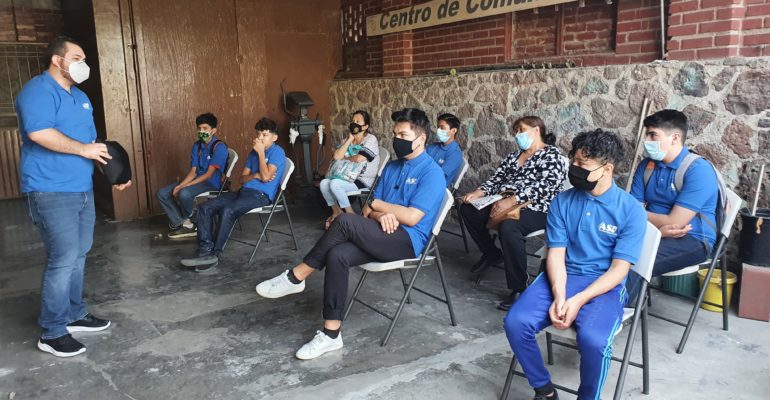
Helping close the digital divide in Tijuana, ASF Alum Luis Andres (left) consults ASF students on proper care and usage of their new laptops at the ASF Community Center patio in Tijuana, B.C., Mexico. October 2020.
Access to the internet and computers is a lifeline for students now more than ever. Read about the crisis facing 1.6 billion youth around the globe.
The coronavirus pandemic has disrupted all of our lives in unprecedented ways, and made existing inequalities widen. One of those disparities, is the digital divide. The digital divide describes the gap between those who have internet access and computers, and those who do not.
Many expenses such as wifi, laptops and cellular data were not within the budgets of underserved communities in Tijuana, Mexico at the start of the pandemic. They are an even more unaffordable expense as a result. At the start of the pandemic only 29% of ASF students had access to a laptop computer. Many were participating in schoolwork on borrowed family cell phones.

ASF Students sound off – we asked students to share what digital access means to them.
Without digital resources to continue schooling their children, some parents in Tijuana are asking to suspend the school year. All over the world the crisis is forcing children to drop out of school and enter labor markets. This disruption is so widespread that UNICEF estimates 24 million children may never return to school as a result of the coronavirus pandemic.
During a pandemic, digital resources provide students with more than just the ability to attend school. Digital access connects us to other human beings, and has become a necessary resource to maintain relationships during a time when we are all forced to be apart. Recent studies have shown depression and anxiety are at an all-time high among children and youth due to the stresses of quarantine and anxiety induced by the pandemic.
It has become even more pertinent to keep children in school, connected and supported. As of today, 73% of ASF students have been equipped with a laptop computer, and 98% of our students have returned for the 2020-2021 school year.
What can you do about the digital divide in your community?
- Donate to organizations like ours! ASF is committed to ensuring students have the means to be successful. In addition to cash donations, if you have old devices or laptops in good condition that you no longer need, ask if you can donate.
- Advocate. Speak up for students, be a vocal supporter of digital inclusion. Have skills to help others with digital literacy and access? Volunteer to make an impact.
- Be Safe. Returning students to school requires community cooperation. Wear a mask and practice social distancing to slow the spread of COVID-19 to keep yourself and your community safe.

